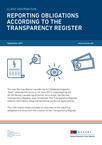
Reporting obligations according to the Transparency Register
This information sheet provides an overview of the reporting obligations arising from the creation of the Transparency Register.
1. Who must report to the Transparency Register?
Only parties referred to in s. 20 para. 1 and s. 21 GwG must report to the Transparency Register (“obligors”).
2. Who are the obligors?
With regard to obligors, a distinction must be made between corporate entities (s. 20 para. 1 GwG; “Vereinigungen”) and other legal entities (s. 21 GwG; “sonstige Rechtsgestaltungen”).
Corporate entities are
(1) all legal persons under civil law, e.g. GmbH, AG, SE and
(2) partnerships listed in the commercial register, e.g. KG, GmbH & Co. KG.
Other legal entities are trusts, unincorporated foundations with vested interests and other types of legal arrangements with a similar structure or function.
Practical tip
Corporate entities that are not registered in a German register are not obliged to report to the Trans-parency Register. Furthermore, registered branch offices of foreign enterprises, according to s. 13d German Com-mercial Code (Handelsgesetzbuch, “HGB”), are not affected by the reporting obligations of the Transparency Register (official explanation of the legislator for the GwG, BT-Drs. 18/1 1555, p. 127).
3. What kind of information must be reported?
According to s. 19 para. 1 GwG, the following information on the beneficial owner must be reported to the Transparency Register:
(1) First name and surname,
(2) date of birth,
(3) place of birth and
(4) the nature and extent of the beneficial interest held by the beneficial owner.
The nature and extent of the beneficial interest describes the circumstances that turn a natural person into a beneficial owner (e.g. capital shares, voting rights, pooling agreements regarding voting, trusts).
4. Who are the beneficial owners?
A beneficial owner is any natural person who ultimately owns or controls a corporate entity or another legal entity.
In the case of corporate entities, with the exception of foundations with legal capacity, a natural person is in control if he/she directly or indirectly
(1) holds more than 25 % of the capital shares,
(2) owns more than 25 % of the voting shares or
(3) exercises control over the corporate entity in a comparable way.
If, after exhausting all possible means, and provided there are no grounds for suspicion, no beneficial owner is identified, the legal representative or the managing partner is considered the beneficial owner: s. 3 para. 3 sentence 5 GwG.
Beneficial owners of foundations with legal capacity and other legal entities are natural persons
(1) who act as trustees,
(2) who are members of the board of the foundation,
(3) who are appointed as beneficiaries,
(4) for whose benefit the trust assets are administered and
(5) who directly or indirectly have a dominant influence on the management of the trust assets in any other way.
5. What kind of obligations exist?
The corporate entities are required to
(1) obtain and hold adequate, accurate and current information (see clause III.) on their beneficial owner (“information-gathering obligations”) and
(2) notify the Transparency Register of this information (“obligations to notify”), sec. 20 para. 1 GwG.
Corresponding with the obligations to notify of the corporate entity, the shareholders of the corporate entity who are
(1) beneficial owners or
(2) directly controlled by a beneficial owner
are required to disclose the information about the beneficial owner to the corporate entity and to provide information about any changes without delay (“disclosure obligations”).
If the shareholder is indirectly controlled by a beneficial owner, the beneficial owner is subject to the disclosure obligations: s. 20 para. 3 sentence 5 GwG.
With regard to the reporting obligations, a distinction must be made between the obligations of the legal entity to notify the Transparency Register (“obligations to notify”) and the obligations of the shareholders to disclose the information internally to the legal entity (“disclosure obligations”).
Trustees, unincorporated foundations with vested interests and other similar legal arrangements are subject to the obligations to notify if they permanently reside in or are based in Germany. Additionally to the other information about the beneficial owner, they have to disclose the nationality of the beneficial owner.
Practical tip
There is no exemption for entities in a group. Notification being rendered by the parent company does not relieve the other group companies from their respective obligations. Therefore, each corporate entity in a corporate group must check if they are compliant with their own obligations to notify. While according to the official explanation of the legislator for the GwG (BT-Drs. 18/1 1 555, p. 127, 130), corporate entities are not obliged to make enquiries about the existence of a beneficial owner, legal uncertainties persist regarding the extent of the information-gathering obligations.
With regard to the fact that the information-gathering obligations and obligations to notify constitute compliance obligations for the legal representatives of the respective entities, the director/management board should take sufficient steps to meet these obligations.
Attention should be paid to the fact that the beneficial owners in group structures have their own disclosure obligations that they must comply with. As long as they indirectly control the legal entity registered in Germany, they must disclose the information about their ownership internally to the respective legal entity.
6. Are there exemptions from the reporting obligations?
The obligations to notify are considered to have already been fulfilled if
(1) the information on the beneficial owner can be derived from the following documents:
a) announcements, according to s. 20 para. 6 German Stock Corporation Act (Aktiengesetz, “AktG”);
b) voting rights notifications, according to para. 26, 26a German Securities Trading Act (Wertpapierhandelsgesetz, “WpHG”);
c) the list of shareholders of German GmbHs;
d) entries in the German Commercial, Partnership, Cooperative and Association Registers
and
(2) said documents are electronically retrievable from the German Commercial, Partnership, Cooperative, Association or Business Registers (“fiction of notification”).
For companies which are listed on a regulated market, according to s. 2 para. 5 WpHG, or are subject to disclosure requirements in accordance with EU law/an equivalent international standard, the obligations to notify are always considered to have been fulfilled.
Practical tip
The extent of the fiction of notification is unclear and therefore gives rise to difficulties in interpretation and to legal uncertainty. If the fiction of notification only applies when the information on the beneficial owner is derived from the register entry of the respective legal entity, the fiction will already reach its limit in a two-tiered group structure. This is because the register entry of a legal entity only contains information about its direct shareholders. Due to the intent and purpose of the fiction of notification, as well as the official explanation of the legislator for the GwG (BT-Drs. 18/1 1555, p. 92, 128), we believe that the fiction applies as long as the information on the beneficial owner can be derived from the register as a whole. This also applies to groups with a parent company listed on a regulated market outside of Germany, provided that the listed company is subject to equivalent disclosure requirement standards.
The information on the beneficial owner must be derived from the documents and register entries listed in s. 22 para. 1 GwG. This means that not all of the content in the registers will result in an exemption. Directors should also check if the information in the registers is up-to-date, since only then will the fiction of notification apply.
7. Where should the required information be reported?
The notification must be submitted to www.transparenzregister.de.
To fulfil the disclosure obligations, the shareholder or beneficial owner must disclose the information internally to the legal representative of the respective corporate entity or other legal entity.
8. What happens in the event of a breach of the obligations?
The breach of the information-gathering, notifying or disclosure obligations is an administrative offence. The administrative offence may be penalised by a fine of up to EUR 5 million or 10% of the total revenue of the entire company: s. 56 para. 1 no. 53-55 GwG. Final administrative decisions and unappealable administrative fines are made public on the website of the supervisory authority: s. 57 GwG.
Conclusion
Even though the fiction of notification should apply to the majority of legal entities registered in Germany, German companies incorporated in a group structure with foreign companies should conduct an in-depth examination as to whether the fiction also applies to them. Ultimately, the question of whether the information on the beneficial owner in complex group structures can be derived from German registers should be scrutinised on a case-by-case basis. For any further questions and information concerning this subject, please feel free to contact us at any time.

